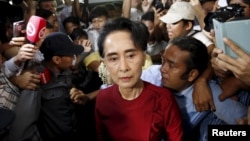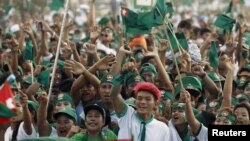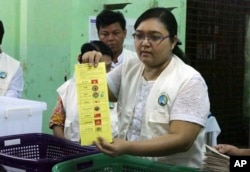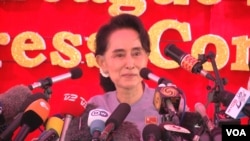Myanmar pro-democracy leader Aung San Suu Kyi joined millions of her fellow citizens Sunday in casting her vote in the country's first relatively free election in a quarter of a century.
The National League for Democracy (NLD) secretary-general was surrounded by hundreds of supporters and journalists at the polling station near her home at the Basic Education Primary School #3 in Bahan township in Yangon.
She did not speak or acknowledge the crowd as her bodyguards made a path for her to the ballot box where pandemonium erupted as photographers and television cameramen jostled to capture the scene.
All polls were to have closed across Myanmar at 16:00 local time Sunday (09:30 UTC) after 10 hours of voting, which saw an approximate 80 percent turnout, according to election officials.
The chief European Union election observer in the country, Alexander Lambsdorff, was upbeat early in the day, but added the election was not free of "flaws or shortcomings." The EU team plans to remain in Myanmar for a week during the post-balloting process.
“We have to see this election within a framework which is not openly democratic in the full sense,” remarked Ireland’s former president, Mary Robinson, observing with the Carter Center.
An estimated 32 million Myanmar citizens are eligible to vote. Millions more people, including Rohingya Muslims in Rakhine state, are disenfranchised for a lack of citizenship and other reasons.
It is not yet known how many eligible voters’ names are missing from the rolls at polling stations but one observer group, Asian Network for Free Elections, described that as its primary concern.
Myanmar’s president has vowed to cooperate with opposition parties for a stable transition should Sunday’s election knock him out of power.
“The government and the military will respect and accept the results," President Thein Sein said Friday as campaigning concluded. "I will accept the new government formed based on the election results.”
Thousands gathered at a rally for the governing Union Solidarity and Development Party (USDP) in Yangon, the country’s largest city, at the same place where opposition leader Aung San Suu Kyi spoke to her supporters last Sunday.
The USDP crowd was significantly smaller than the numbers drawn to Aung San Suu Kyi's National League for Democracy's rally. Most of those at Friday's USDP gathering appeared to be teachers and civil servants brought to the venue by the government on public buses.
But much of the support seemed genuine. “We have seen a lot of development during Thein Sein’s five-year presidential term,” said USDP supporter Ma Thadar Aung, a store saleswoman. “We get mobile SIM cards cheaply now.”
The election is the first since a nominally civilian government was established in 2011, a year after opposition leader Aung San Suu Kyi was freed from house arrest and a ban lifted on her National League for Democracy.
Aung San Suu Kyi and her party scored a resounding victory in 1990 but were prevented from taking power. The NLD is expected to do well again this time against the USDP, which has the backing of the powerful army.
The ruling party contests the election with one decided advantage: 25 percent of the seats in parliament are reserved for military officers.
Calls for free, fair vote
Several diplomatic missions, including the United States, joined the United Nations in issuing a statement Friday calling “on all stakeholders to ensure that these elections are conducted peacefully, transparently, and in accordance with the will of the people.”
Britain's ambassador to Myanmar, Julian Braithwaite, said "a vote that is credible, inclusive and transparent and which represents the will of the people would stand as a lasting legacy" for the current government.
The rights of tens of thousands of people from disenfranchised ethnic and religious communities — including the largely Muslim Rohingya people — is a particular concern, the British envoy said.
At the U.S. State Department, spokesman John Kirby has said key U.S. officials are closely watching the elections as an index of Myanmar's progress from military dictatorship to democracy.
Amnesty International said the jailing of peaceful activists, restrictions on free speech and other discrimination against minority groups are a serious problem undermining the electoral process in Myanmar, also known as Burma.
Burma political experts say the NLD needs to capture 67 percent of the parliamentary seats in Sunday’s election to overcome the military’s veto in the bicameral legislature, known as the Pyidaungsu Hluttaw, which selects the president.
Aung San Suu Kyi, who has urged everyone participating in the general election to ensure a fair, free and smooth vote, is prevented from becoming president even if her party is victorious. The military junta governing in 2008 placed a clause in the constitution barring anyone with a foreign spouse or children from holding the highest office. Aung San Suu Kyi’s late husband was British, as are her two children.
“I don’t believe Suu Kyi can help us. She married a foreigner. That’s why foreigners might govern our country if she wins this election,” Ma Win May, a villager from Sake Gyi on the outskirts of Yangon, said at Friday’s USDP rally.
'Above the president'
Speaking to reporters Thursday at her residence, Aung San Suu Kyi said if the NLD prevails she “will be above the president.”
Her comment has some observers, not only in Myanmar, apprehensive. She did not explain her remarks.
“The president should be under the law. Everybody should be under the law,” David Steinberg, distinguished professor of Asian studies at Georgetown University in Washington, told VOA. “All of a sudden I think she is saying she would not be subject to that law. So this is a very important deviation from what she has said in the past and her beliefs.”
Nearly 7,000 candidates from 91 parties are running for posts in both houses of parliament.
Myanmar, a former British colony, was isolated from most of the world for decades after General Ne Win in 1962 staged a coup, abolishing the Buddhist-majority country’s constitution and its democratic government.
The national election on Sunday is the first since 2011, when nearly 50 years of military dictatorship came to an end in the country.
Zinlat Aung and Su Htwe Aung contributed to this report.



